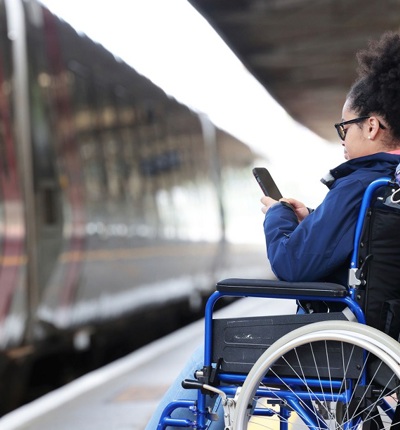
Compensation for disabled rail passenger assistance failures to be reviewed
After a challenge over the practice of capping of compensation for disabled rail passengers who do not receive their pre-booked assistance at the price of the ticket, the Office of Rail and Road (ORR) will soon be launching a consultation into the guidance it provides to train operators about Accessible Travel Policies.
Posted on 12 May 2025
A letter before action was sent on behalf of disability rights campaigner Doug Paulley, represented by Claire Hann, solicitor at law firm Leigh Day, and Hollie Higgins, Barrister at Blackstone Chambers. The letter highlighted the issues disabled passengers face when seeking compensation from train operators who fail to provide pre-booked passenger assistance.
The letter followed Mr Paulley receiving Rail Ombudsman decisions linked to his own experiences of facing pre-booked assistance failures for which he was awarded £125 compensation in one instance and £1,200 for a similar assistance failure.
Train operators are required by their operating licences to establish and comply with their Accessible Travel Policies (ATP) which must be approved by the ORR who determine whether they are compliant with statutory guidance.
Mr Paulley believes that the ORR had wrongly been approving ATPs which allowed train operating companies to limit the level of financial compensation awarded to passengers to the price of their ticket.
Failure to provide passenger assistance is often a breach of equality legislation for which passengers are entitled to damages. Mr Paulley believed that, as a result of the ORR not recognising this, disabled passengers were being systemically undercompensated.
Following Mr Paulley’s letter before action, the ORR has confirmed that it intends to open a public consultation on proposed changes to its ATP Guidance which will ensure that claims for compensation are considered on a case by case basis, with no ticket-price cap on financial redress for disabled passengers who do not receive their pre-booked passenger assistance.
In a subsequent letter to train operators, Stephanie Tobyn, the ORR director of strategy, policy and reform said: “We plan to review the redress requirements set out in section A8 of our ATP Guidance to ensure that they create an appropriate enabling framework for disabled people to access redress where assistance fails.”
In an accompanying release, the ORR stated that redress claims for failed rail passenger booked assistance should “always be assessed on a case-by-case basis, rather than based on ticket price”.
Doug Paulley said:
“For far too long, a number of train and station operators have failed to treat assistance failures as what they are: incidents which have a profound effect on disabled travellers. As a result, compensation has been capped at the cost of travel, as opposed to the thousands that may rightly be awarded in court.
“It is good to see that the ORR may finally recognise appropriate compensation for assistance failures. I hope that as many disabled people as possible can now receive the appropriate compensation for their distress.
“Though, I am worried that these changes only apply to booked assistance. The ORR and train companies must also give consideration to Turn Up And Go.”
Claire Hann said:
“I am pleased that following our letter, sent on Doug Paulley’s behalf, the Office of Rail and Road will be reviewing its guidance. Disabled passengers should be able to receive fair and proportionate redress based on their individual case, not based on the price of their ticket.”

Settlement agreed with Croydon Council to improve voting accessibility for blind voters
Dr Yusuf Ali Osman, who is registered blind, has reached a settlement with Croydon Council after challenging it for failing to make reasonable adjustments to make postal voting more accessible for him.

Coroner warns Transport for London intoxicated passengers could die if safety is not improved following inquest into the death of artist, Sarah Cunningham
The coroner at the inquest into the death of artist, Sarah Cunningham who died at Chalk Farm London Underground station has warned Transport for London (TfL) that intoxicated passengers could die on its network unless safety improvements are made.

Injured and bereaved people call for answers from TfL after figures show alarming rise in deaths and serious injuries on London transport network
A group of people injured or bereaved in incidents involving London tube trains and buses are calling on the government to ensure Transport for London addresses safety issues and reports serious incidents more openly.

